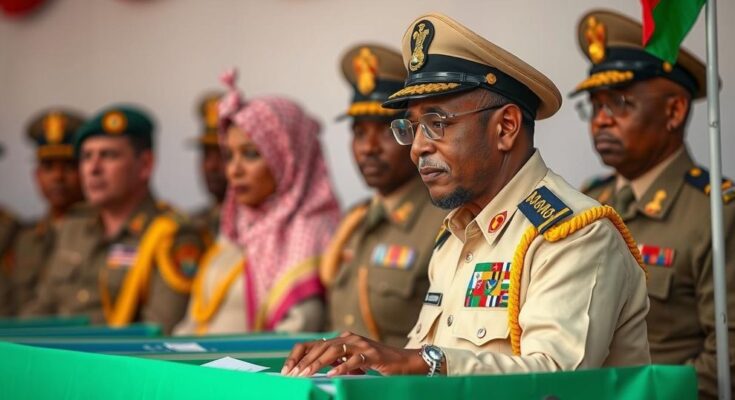Chad held a general election aimed at transitioning from military rule after three years, yet voter turnout was low as opposition called for a boycott. Preliminary participation was pegged at 38%. Many citizens expressed skepticism about the credibility of the electoral process.
Chad conducted its general election after a three-year period of military governance. Despite government claims that this election marks a pivotal move towards the restoration of democracy, voter turnout was anticipated to be low as the opposition promoted a boycott. Preliminary reports revealed an estimated participation rate of 38%, attributed by officials to inclement weather, although many citizens expressed skepticism towards the electoral process, citing predetermined outcomes.
Opposition leader Succes Masra claimed, “They have all stayed at home following our call, that is, the overwhelming majority,” highlighting the discontent among the populace. Candidates aligned with President Mahamat Idriss Deby Itno are likely to dominate the election, as he has previously been criticized for having ascended to power following a military coup in 2021 and for overseeing a presidential election that was widely denounced as fraudulent.
President Deby urged citizens to vote, proclaiming the day to be historic while casting his ballot publicly. Nevertheless, disillusionment among citizens was apparent, with individuals such as Herve Natouingan expressing that participating would be unnecessary due to a lack of genuine democratic engagement in Chad.
Polling was conducted over the weekend for military personnel and nomadic herders, while election officials insisted that record participation had been reported in these groups. The elections are viewed as crucial by the government for addressing local issues, including pressing concerns stemming from climate change and security threats from Boko Haram.
Despite these claims, the opposition called for thorough monitoring of the electoral process, citing instances of ballot tampering and fraudulent activity. The electoral atmosphere is further complicated by a cessation of military agreements with France and regional security challenges. The government maintains that these elections signal the final steps in establishing a democratic framework in Chad, following President Deby’s rise to power after the death of his father, a long-standing leader.
Chad has been under military rule since April 2021, following the death of President Idriss Deby Itno, who had been in power for over three decades. The military government, led by Mahamat Idriss Deby Itno, has faced widespread criticism for the way it has managed the transition to civilian rule, particularly regarding the conduct of free and fair elections. The recent electoral process is seen as a pivotal moment for a country beset by challenges such as public discontent, economic hardship, and security threats from extremist groups like Boko Haram. Amid ongoing calls for reform, the elections are viewed by the government as necessary for implementing changes at the local level, particularly in addressing socioeconomic issues exacerbated by climate change and regional instability.
The recent general election in Chad reveals significant divide and distrust between the ruling government and the populace. Despite official narratives promoting the election as a move towards democracy, widespread reluctance to participate, as evidenced by low turnout and boycotts spearheaded by opposition parties, suggests that many citizens remain unsatisfied with the political process. With the ongoing challenges of climate change and security concerns, the future direction of Chad’s governance and its impact on civil society remains uncertain.
Original Source: www.rfi.fr




